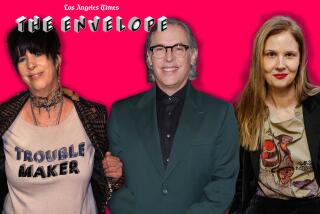Let’s Hear It for Earl Warren . . . Our Man of the Century
- Share via
I have a letter from my old friend John Weaver, reminding me that Tuesday will be the centenary of Earl Warren’s birth.
It is not likely, in this moment of triumph for George Bush and Gen. H. Norman Schwarzkopf, that any celebration will be raised in memory of Justice Warren.
Weaver is the author of “Warren: The Man, the Court, the Era,” a definitive biography of a man I consider the man of the century.
In his letter Weaver expresses his regret that an anecdote I told him about Warren was not in the book. “Somehow,” he said, “in the course of last-minute revisions,” it was lost.
Weaver had wanted the anecdote because he thought it showed that Warren, despite his solemn exterior, had a sense of humor.
I went to work for United Press in Sacramento the day Earl Warren was inaugurated as governor. I stood in the hall of the Capitol and saw him walk toward his office--a large, ruddy, fit man, full of confidence.
One day a woman came to the UP office with a bag full of complaints against Warren, based mostly on his alleged sins against her as district attorney of Alameda County and later as attorney general. It was obvious that she was a mental case.
That evening I happened to attend a cocktail party at which Gov. Warren was present. Finding myself alone with him, I told him about his antagonist. “I concluded,” I said, “that either you or she is crazy.”
He considered it. His demeanor was that of a Supreme Court justice weighing a point of law. He nodded solemnly.
“I’ll go along with that,” he said.
Later, as chief justice of the United States, I think Warren often found that some of our laws were crazy.
Perhaps the only black mark against Earl Warren was his approval of the incarceration of Japanese citizens after Pearl Harbor. Surely his later rulings for blacks, as chief justice, would condone that error.
No doubt Earl Warren was ambitious. He wanted to be President. But he did not want to be vice president. He declined Tom Dewey’s offer to run with him in 1944. But not in 1948.
In his extemporaneous acceptance talk, Warren said, “For the first time in my life, I know what it feels like to be hit by a streetcar. . . . I had no idea, I assure you, that there was any such shock as this awaiting me today, and before you change your mind, I want to say that I accept the nomination.”
Mr. Warren’s innocence may seem fraudulent, but on the other hand John Weaver’s book notes that Mrs. Warren was so taken by surprise that she had absolutely nothing to wear for the press presentation of Mr. Warren and Mr. Dewey.
By the way, they lost.
Warren was born in Los Angeles. But his father moved the family to Bakersfield when Earl was a kid. As a boy he worked and read. His father bought him and his sister an encyclopedia and never denied them any book they wanted. He went to Washington grammar school and Kern County Union High School, both of which are my wife’s alma maters.
Warren was attorney general when a burglar murdered his father, apparently because the elder Warren was reputed to have saved a large sum of money.
Warren took personal charge of the investigation, but the murderer was never found.
In a recent memoir about the chief justice, Weaver remarked that “Warren left the bench secure in the knowledge that never again would blacks huddle in the back of the bus.”
Earl Warren is not the only illustrious citizen from Bakersfield. Frank Gifford is known as the commentator on ABC’s Monday night football. He was a star halfback at Bakersfield High School, at USC and for the New York Giants. Dennis Ralston was a tennis player of international note. Rick Mears is a champion race driver. Merle Haggard is a country music star. So is Buck Owens.
Well, one might expect race car drivers and country music singers to be from Bakersfield; even football stars and tennis players.
But it might be surprising that Lawrence Tibbett, the famous operatic baritone, was born there, though he attained his fame at the Metropolitan in New York and in the movies.
Many Bakersfield sons came home to live. Among them was David Goldberg. David was a classmate of mine and certainly the smartest person I have ever known. I boarded at his home for a time and saw how his father studied, night after night.
David was a brilliant debater in college, a national champion. He went away to law school but came back to become a prosecutor in the Kern County district attorney’s office. Now he is a prominent attorney in private practice. If you live in Bakersfield and have a legal problem, I advise you to get David.
Of course, I ought also to mention my wife, whose alma mater was the same as Earl Warren’s.
More to Read
Get the L.A. Times Politics newsletter
Deeply reported insights into legislation, politics and policy from Sacramento, Washington and beyond. In your inbox twice per week.
You may occasionally receive promotional content from the Los Angeles Times.










